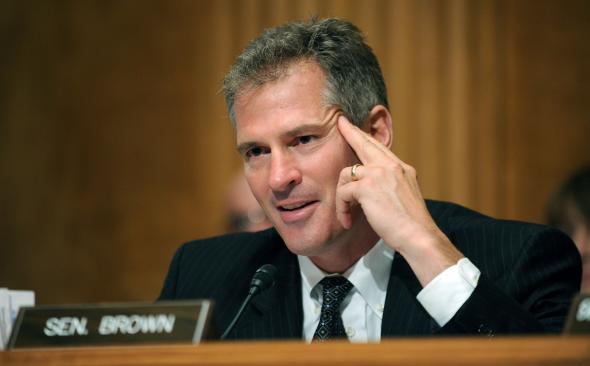Scott Brown’s Latest, Weakest Excuse for Embracing Super PACs

Photo by Tim Sloan/AFP/Getty Images
When they're not trying to debunk Nate Silver, Democratic Senate campaigns are trying to kneecap their strongest opponents the second they walk into the ring. In Colorado they got Rep. Cory Gardner to make an embarrassing reversal of his old support for fetal "personhood" amendments. In New Hampshire they're shaming Scott Brown for refusing to sign a "People's Pledge" with Sen. Jeanne Shaheen. In 2012 Brown proposed a deal with Elizabeth Warren: Pre-denounce super PAC spending and keep it out of the state, to cut down on the anonymously funded TV ads.* Shaheen has goaded him about signing a new version of the pledge. This poses some risk to the cool-dad/guy-you'll-have-a-beer-with appeal that has made Brown electable. Brown, who—again—came up with the pledge in the first place, keeps saying no to a Pledge 2.0.
Brown called the request “hypocritical,” pointing to a West Coast fund-raising swing by Shaheen, and told reporters that the “horse has kind of left the barn.”
“Before I even thought of becoming a candidate, Jeanne Shaheen’s allies in Washington were running negative ads against me for months,” Brown said in a statement.
This is lame stuff that ignores how the first pledge came about. It happened after Brown allies spent months attacking Warren with TV ads. On Nov. 9, 2011, Crossroads GPS went up with a TV ad ripping Warren for saying she'd provided the "intellectual foundation" for Occupy Wall Street.
One month later, Crossroads GPS went back on the air to attack Warren for her TARP oversight. Yes, after attacking her osmotic endorsement of #Occupy, they said she was too close to Wall Street. It's politics, don't think too hard about it.
It was only at the end of January, two months after Karl Rove's group had splattered Warren with its contradictory messages, that both candidates signed the pledge. Nobody claimed that the "horse was out of the barn." That was the point—it was early and the horse could easily be led back into the barn.
*Specifically, the candidates pledged to give $1 to charity for every $2 a super PAC or 501 spent against their opponent. It wasn't ironclad, but it cut down on outside spending.
